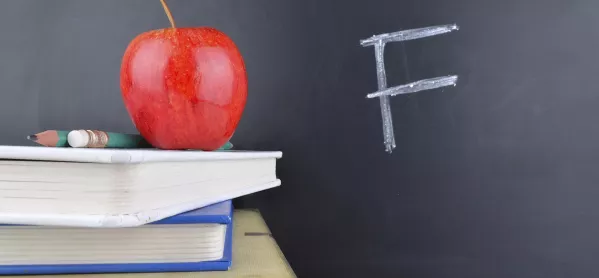When I was 17, one of my favourite teachers, Mrs Murphy, predicted that I would achieve an E in my final A2 exam in English. I was absolutely devastated. I had only managed a “D” at AS English but knew deep down that I hadn’t put in anywhere near the amount of effort required to achieve more. I was absolutely gutted and although pretty immature at the time, I did have some period of introspection based on that letter on that piece of paper.
Mrs Murphy probably thought little of it. She was just giving a sincere and honest appraisal of my attainment and making a professional judgement on where I was heading. She probably sat in the staffroom afterwards and said, “I think Tom will fail his English exam.” And there would have been some nods of approval. However, this was the year 2001 in an all-boys grammar school where most classrooms had a chalkboard, the majority of reports were written in pen and, most importantly, the all-pervading culture of blame and suspicion was yet to fully engulf the teaching profession.
Nowadays, the hawks and perhaps even younger, less experienced colleagues than Mrs Murphy, would have immediately asked: “What are you going to do about it?”, “Do you need to change the way you teach?” and “What extra interventions and revision sessions are you going to run for Tom?” Senior leaders would have quickly analysed the predicted grades provided by Mrs Murphy and already arranged a meeting with her to discuss why Tom wasn’t “engaging with her teaching” and asking “How are you going to ensure that all students make 3 levels of progress?” In a scene akin to an episode of Homeland, the interrogation would leave Mrs Murphy wondering who she could trust. Meanwhile, a seed of doubt about Mrs Murphy’s competence would be planted in the subconscious of those wanting a quick fix to their own data sets.
At this moment, Mrs Murphy becomes Tom and Tom becomes Mrs Murphy. Whereas one is an immature, lazy 17-year-old who is more interested in watching WWE and playing GoldenEye 007 on the Nintendo 64 than working, the other is an experienced, erstwhile, committed teacher who has already given a good 20 years of service. But, they now morph into one massive blob. And whereas only one of them has failed, the fact that their fortunes are tied together in knots means both of them will bear the consequences.
Thankfully, back then, I was allowed to get upset about the grade I was predicted. I was allowed to feel angry and frustrated. Thanks to the ethos of my school and parents, I understood that it was my responsibility to improve and get better - to work harder. So I did. And I came out with a B in English literature. I didn’t need to be cradled in the arms of pastoral leaders and coerced into attending multiple revision sessions. I didn’t need prizes, faint praise or to be showered with special privileges. I had failed and I needed the unmerciful impact that only cold, hard reality could provide. As a teenager, I wouldn’t have known that, but thankfully those responsible for my education understood what was required. Meanwhile, Mrs Murphy was allowed to get on with her work and granted the autonomy to make decisions, in a similar way to how a doctor or lawyer would be. She was the one in the classroom. She was the one in control.
Has failure become a dirty word in schools? Have we forgotten that failure, although obviously not a good or pleasant thing in itself, is a fundamental ingredient in future success? Just ask Winston Churchill, who endured disaster after disaster up to 1942, Richard Branson who was rejected more than 1,000 times in his search for investment or even David Beckham, who once upon a time, lost us the world cup because he lost his temper. Educationalists are keen to talk about instilling “resilience” in their students but many are unwilling to accept that giving students and their teachers increased autonomy and independence is vital in developing it.
Let’s get back to a time when a student, god forbid, could actually be blamed for their own exam performance. A time when the default position was one of trust in teachers and what they do. Let’s support, respect and nurture our young people but never compromise on our pursuit of educational purity. Let’s press the reset button and create a just equilibrium between student responsibility and teacher accountability. This is vital for our society in the long run, because in promoting the mantra that failure is always someone else’s fault, we deprive our young people of one of the key drivers of change and progress: the realisation of failure.
Tom Rogers tweets as @RogersHistory and runs rogershistory.com
Want to keep up with the latest education news and opinion? Follow TES on Twitter and like TES on Facebook




